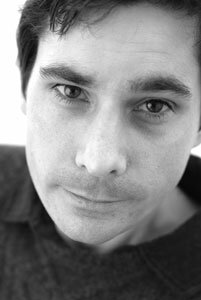FACETIME- Computerized Coffey: How Ted breaks sound barriers
Whale songs, creaking wood, lapping water, electronic static– those were the unexpected noises Piedmont Virginia Community College students heard last November as they were walking to class through the glass-walled South Gallery of the V. Earl Dickinson Building. The ever-changing soundscape was the computerized creation of UVA music prof Ted Coffey, who composed the piece to address how military and industrial operations are endangering whales.
"I really care about community interface," says Coffey, 37. "I'm not trying to make a first-order narrative where the listener rides along– I'm trying to do something different."
Another recent project, "Boom Box Amoeba," had Coffey and 25 students from his "Music and Technology" class strolling around UVA en masse, carrying CD players playing music they'd collectively composed.
Coffey began playing guitar at age five and spent time experimenting with a four-track tape deck in high school. But he says his musical approach really began to take shape at Dartmouth College, where he studied under electronic music pioneers Jon Appleton and Christian Wolff.
"When you're composing," Coffey says, citing a lesson he learned from Wolff, "you're involved in proposing ways that the world and human society can be."
After earning a doctorate at Princeton, Coffey joined UVA's Virginia Center for Computer Music in 2005, attracted by the opportunity to work in both acoustic and computer composition. "The entire department is very forward-looking and brimming with intellectual curiosity," he says.
Coffey's own work melds environmental sounds– such as ducks, insects, fire, and the human voice– with electronics and more traditional instrumentation. "Sometimes I work with the listener and give the listener continuity and safety. Other times I don't," he explains. "There's just something that turns off in people when they're drinking a Coke."
"What's fun is that Ted often sets up scenarios where a beautiful moment is interrupted by aggression, and passages of aggressive material are interrupted by sudden changes to beauty," says Coffey's frequent collaborator, New York-based composer and musician Kojiro Umezaki. "It can be a roller coaster ride, and as one of the performers, you're the driver."
Currently, Coffey and Umezaki are working together on a piece for parks and other public spaces. Entitled "Fountain Music," it involves five remote-controlled boats outfitted with parabolic speakers. Coffey is also collaborating with his wife, ceramics artist Rebekah Wostrel, on a May exhibition for Richmond's 1708 Gallery.
In his off hours, Coffey admits, "I love Buffy the Vampire Slayer to an almost unnatural degree." And he offers this Buffy-like summation of his music: "Even when I have loud aggressive elements, I want anima to win. I want gentleness and touch to win. And it always does– I never write a piece where the bad guy wins."

Ted Coffey
PHOTO BY JEN FARIELLO
#